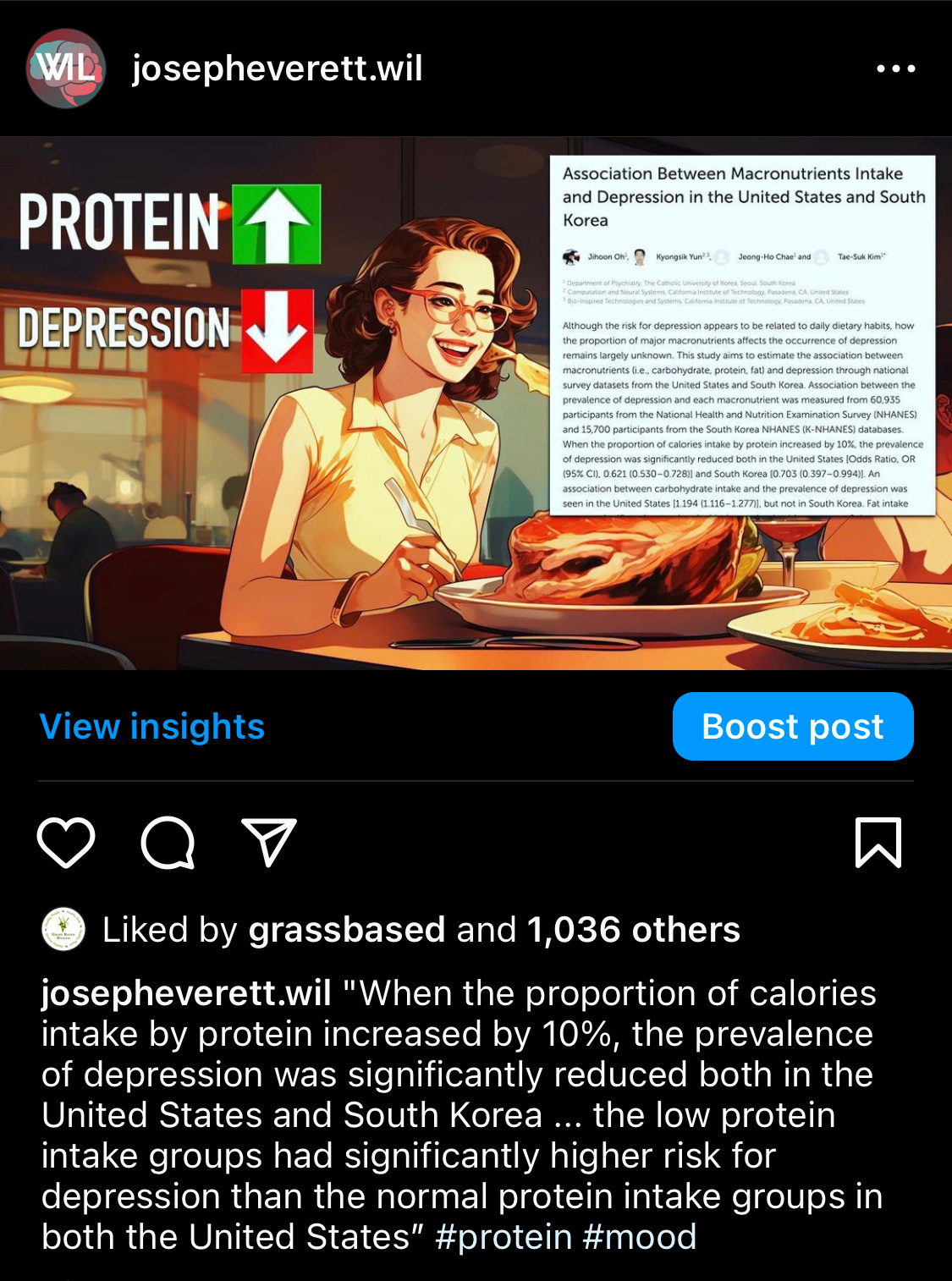Your Brain craves Protein
Not enough people are talking about protein & exercise's role in maintaining a healthy brain.
I just released article #2 about protein titled You’re not too fat, you’re under-muscled where I present the idea that we should focus more on having healthy muscle more than having tunnel vision on losing fat. For this third protein-focused article, let’s talk about protein, muscle and exercise’s benefits on alertness, mood and the brain in general. I’m mixing the three together because as discussed in the last article, higher protein intake generally suggests more muscle mass and of course exercise means more healthy muscle.
Ample protein appears to be really important for the brain. I recently posted this study above finding an association between protein intake and reduced risk for depression. Another 2020 study concluded that “total protein intake and protein intake from milk and milk products might reduce the risk of depressive symptoms in US adults.”
Of course we eat protein for the amino acids it contains, and those amino acids are are important precursors of neurotransmitters, especially in the brain. As just one example, maybe you’re aware of the amino acid tryptophan being the precursor to serotonin. A small study analyzing subjects who slept at a sleep lab found that those who ate protein rich in the amino acid tryptophan were more alert in the morning likely due to improved sleep quality. With that in mind, how does protein consumption play out for people’s brain function as they age?
According to a March 2020 study:
Compared with the healthy elderly, patients with dementia have significantly lower protein intake and lower protein intake of patients with dementia is reported to be associated with severe dementia.
Drawing on multiple papers the authors of that 2020 study explain:
Nutritional epidemiology has shown the importance of protein intake for maintaining brain function in the elderly population. … The levels of protein intake in aged people are positively associated with memory function , and elderly people with high protein intake have a low risk of mild cognitive impairment (MCI). Moreover, elderly people with high protein intake have recently been reported to have low amyloid β accumulation in the brain.
On the flip side, there are multiple studies like this one from 2018 that find an association between lower cognitive functioning and lower muscle strength and muscle mass.
This study interestingly demonstrated that patients on dialysis with more muscle mass had significantly higher rates of survival.
A clinical trial even found that snacking on high protein foods in the afternoon “improves appetite, satiety, and diet quality in adolescents, while beneficially influencing aspects of mood and cognition.” A 2021 study out of China found that kids on a higher protein diet had better math scores.
I would be really interested to see some studies on the effect of diets with differing macronutrient compositions on pro gamers’ performance. People competing at that level are operating at the peak of (a specific type of) mental fitness. There are very few gamers past the age of 31 and a study from PlosONE titled Over the Hill at 24 suggests that once you hit 25, you’re pretty much too old to be a pro gamer because that is when reaction times start to wane. Maybe gamers would benefit from a more protein-rich diet.
A randomized control trial looking at the “effect of a high protein meat diet” on cognition found those people in the group getting the high protein diet “improved their reaction time significantly” compared to the “usual” protein diet group. Maybe gamers themselves have already picked up on the importance of protein … considering an 2023 article titled What Do Gamers Eat? alleges that gamers eat “too much meat,” according to a 2021 German study.
One other important aspect of day-to-day cognition is your level of alertness. You might have an IQ of 135, but if you need a coffee to wake up, a coffee to get through the post-breakfast slump, another coffee to get past the post-lunch slump and another coffee to get past the midday slump, maybe your brain isn’t performing so well. There’s a lot of factors to a situation like that, but when it comes to protein, one thing you should know about is a neuropeptide called orexin.
Protein, Alertness and being Tired all the time
Keep reading with a 7-day free trial
Subscribe to Joseph Everett’s WIL Newsletter to keep reading this post and get 7 days of free access to the full post archives.









